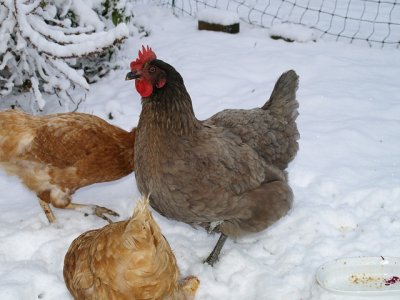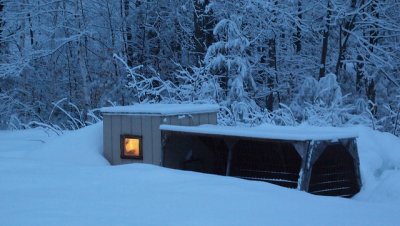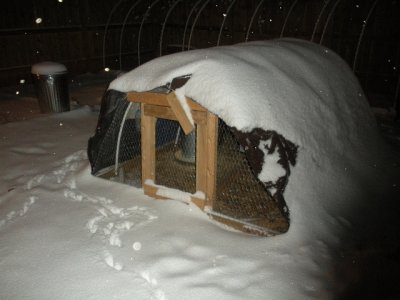





Are your birds prepared to face the winter?
Fluff up your feathers, because it is about to get chilly. Winter is coming, as HBO's hit series Game of Thrones likes to remind us, and it is time to ready our chicken coops for the long, cold months ahead.
Upstate New York is cold. My chicken-keeping friends and I go to great lengths to keep our birds comfortable when the mercury falls below zero. Frozen eggs, frozen combs, frostbitten feet, and frozen water are all par for the course in colder climates. Luckily for chicken enthusiasts, chickens themselves are very cold tolerant. There is a reason we wear down winter jackets, after all. Feathers are warm.
Chickens need a place out of the wind and access to fresh water and food to happily survive the winter. In many ways, they are better equipped for the cold than we are. Here are a few tips from Upstate backyard chicken keepers to help hen houses in every cold climate thrive.

Add Lights To Chicken Coops
Some chicken keepers prefer to let their birds rest during the winter. I personally like my birds to earn their keep with nutritious eggs all winter long. In return, I make sure they have plenty of fresh water, fresh food, and the latest treats from the compost pile.
The best way to keep egg production up in the winter is to add lights to the inside of the coop. This also helps illuminate the coop in the mornings and evenings when the sun rises after us and sets before we get home from work. Hunting for eggs in the dark is not fun. Energy efficient fluorescent bulbs are best for chicken coops. Not only are they energy efficient, but the bulb does not generate dangerous amounts of heat. The last thing you want are singed wings or a coop fire. Install your bulbs away from roosts to further prevent injury, preferably with a light cage around the bulb like the kind sold in hardware and farm and garden stores.

Deep Litter
Deep litter is a bedding technique that not only keeps your coop warm but eliminates the need for frequent cleaning in the winter time. Deep litter works best in small coops, as the cost of purchasing bedding increases with the size of the coop, and the efficiency decreases.
In a deep litter system, a large amount of wood shavings are put in the coop and sprinkled with diatomaceous earth. The diatomaceous earth prevents mites and other parasites from building up in the litter, while the shavings catch the droppings. All you as a chicken tender have to do is stir the bedding periodically to encourage the composting process and add more shavings throughout the winter. The compost heats the coop, and you do not need to scrape frozen droppings off of the coop floor.
Best Ways To Insulate The Coop
Technically chickens do not really require coop insulation. If your coop blocks the wind, your chickens are happy campers. I still feel better about giving my birds a little extra protection from blowing wind and snow. Just remember that even in the depths of winter, your chickens still need coop ventilation to stay healthy.
The best insulation for your chicken coop is whatever material you happen to have lying around. Plywood, straw bales, tarps, extra greenhouse plastic, extra sheets of foam insulation, snow, or even a thick blanket are perfectly adequate insulation materials for your coop. These extra measures block the wind and help keep the body heat generated by your birds inside the coop.

Water Heaters
Keeping water fresh and liquid is tricky when the temperature drops below freezing. Water heaters are the best option for keeping water thawed in cold climates. Otherwise, the only alternative is watering the chickens multiple times a day. Depending on the size of your flock, this is impractical.
There are many water heaters available on the market. Some are designed specifically for chicken waterers, others are geared towards larger livestock or pets. Most work just fine for your chickens. Select the heater in your price range, or make your own water heater.
It is surprisingly easy to make your own chicken water heater. All you need is a tin (like the kind cookies come in), a 40 watt light bulb, and a lamp replacement light bulb cord. The heat from this device is enough to keep your water thawed. The water heater I made using this method lasted for years, although I did have to change the bulb once or twice.
Collect Eggs Often
The best way to avoid frozen eggs is to collect eggs frequently. I check the coop two or three times a day in the wintertime. This way, I catch any eggs that are laid before or after the usual laying time for my flock, preventing losses. Take note of when your hens usually lay and try to collect shortly afterward.
For chicken enthusiasts who work full time, collecting eggs midday is not always an option. Make sure each nesting box is full of thick bedding to help insulate the freshly laid eggs, and collect as soon as you get home.
This winter, give back to your chickens for all of the eggs they put in your basket. Follow these tips and feel free to add tips of your own to the comments section. Your chickens will thank you.
Copyright © www.100flowers.win Botanic Garden All Rights Reserved